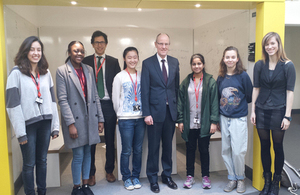School Reform Minister celebrates International Women’s Day
School Reform Minister marks International Women’s Day with a visit to a new specialist maths school with 43% female intake.

School Reform Minister Nick Gibb visited King’s College London Mathematics School in Lambeth today (6 March 2015) to meet a group of female mathematicians and to congratulate the staff on achieving a 43% female intake in its first year.
The specialist school, which opened in September 2014, is for students aged 16 to 19.
Girls are now as likely as boys to take separate science GCSEs, and they perform similarly in maths. A level entries by female students are rising, with 10,000 more girls studying STEM A levels since 2010.
However, there remains a significant imbalance between the sexes at A level, which makes King’s College London Mathematics School’s achievement in attracting so many female students all the more noteworthy.
In 2014, 48,401 boys took maths A level, compared to 30,635 girls, whilst 25,490 boys took A level physics compared to only 6,736 girls.
The visit is part of a series of ministerial engagements to mark International Women’s Day on Sunday 8 March.
School Reform Minister Nick Gibb said:
International Women’s Day encourages us to celebrate what women across the world have achieved in the past; and also to ask what more we can do to remove the barriers to women’s progress in the future. It is our job to ensure more young women have the scientific education they need so we have the female scientists and mathematicians of the future to follow in the footsteps of pioneers such as Marie Curie and Rosalind Franklin.
STEM subjects open doors to wide range of exciting careers - and will be increasingly important by the time these young people start their working careers, with 7.1 million people in the UK expected to be employed in science-based roles by 2030.
The gender imbalance feeds through into higher education with only 14% of those starting their first degree in engineering and technology in 2012 to 2013 being women. This not only narrows the range of careers that women can go into, but can also have an adverse impact on earning potential. According to the Institute of Education, those with careers in science or technology earn 19% more on average than those in other sectors.
Dan Abramson, headteacher at the King’s specialist maths school said:
We are breaking national trends relating to the take-up of mathematics and physics by girls, suggesting that existing and historic patterns about gender and STEM are changing. Our pioneering students will go on to become inspirational role models and prove by example that women can achieve everything that men can in STEM careers.
To encourage more young people to take maths and science subjects, particularly girls, the government is supporting the Your Life campaign, which already has more than 200 pledges of support from businesses and other organisations to help boost participation in technology and engineering. Its aim is to raise the numbers progressing to maths and physics at A level and beyond. We are also funding additional training for 17,500 maths and physics teachers over the next 5 years, with schemes to attract more postgraduates, researchers and career-changers, and extensive retraining for non-specialist teachers.
In February the government published ‘Your daughter’s future’, a new guide for parents on supporting daughters to consider a wide range of options when making decisions on education and careers.
Notes to editors
- Read more information about the Your Life campaign.
- Additional training for 17,500 maths and physics teachers was announced by the Prime Minister on 8 December 2014.
- Read more information on ‘Your daughter’s future’.
DfE media enquiries
Central newsdesk - for journalists 020 7783 8300